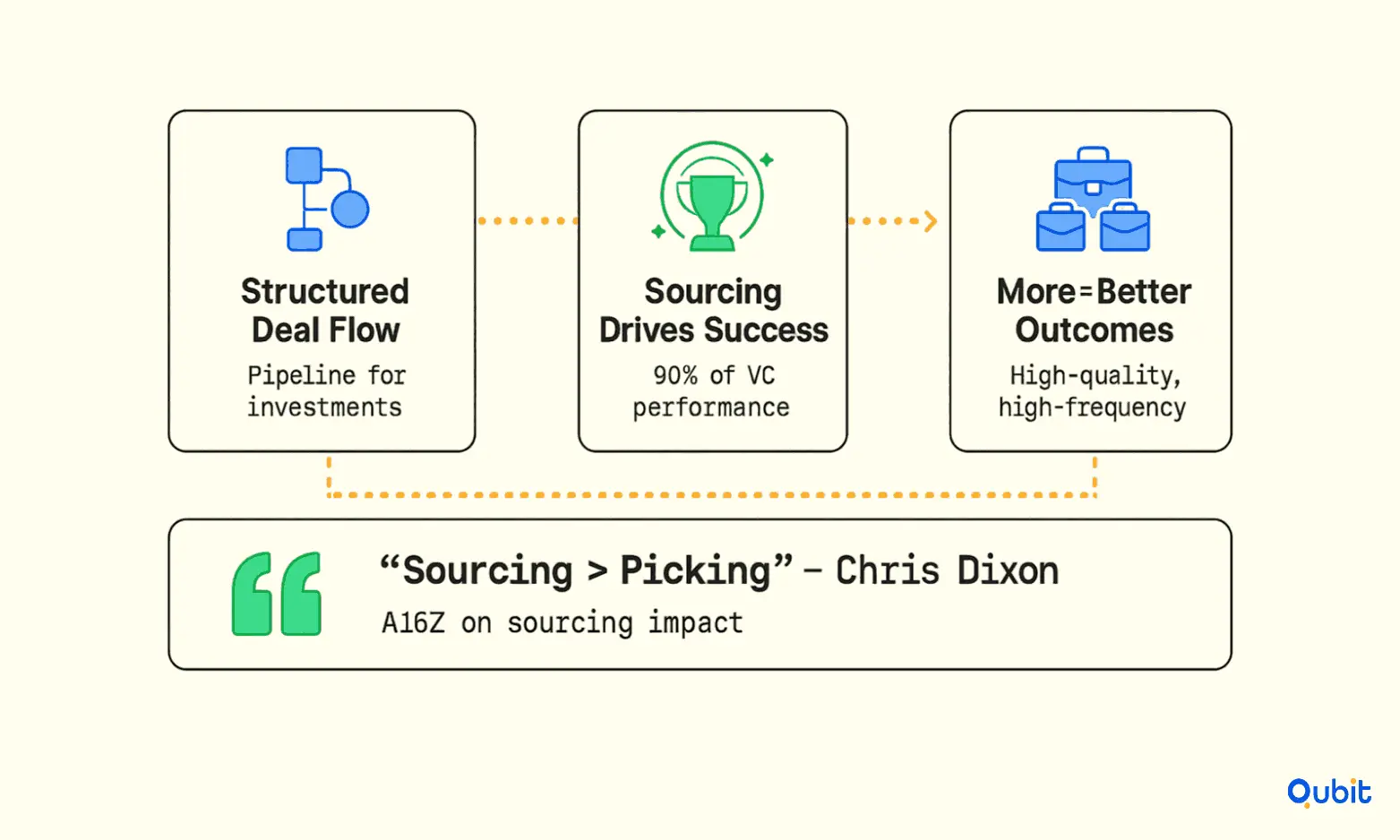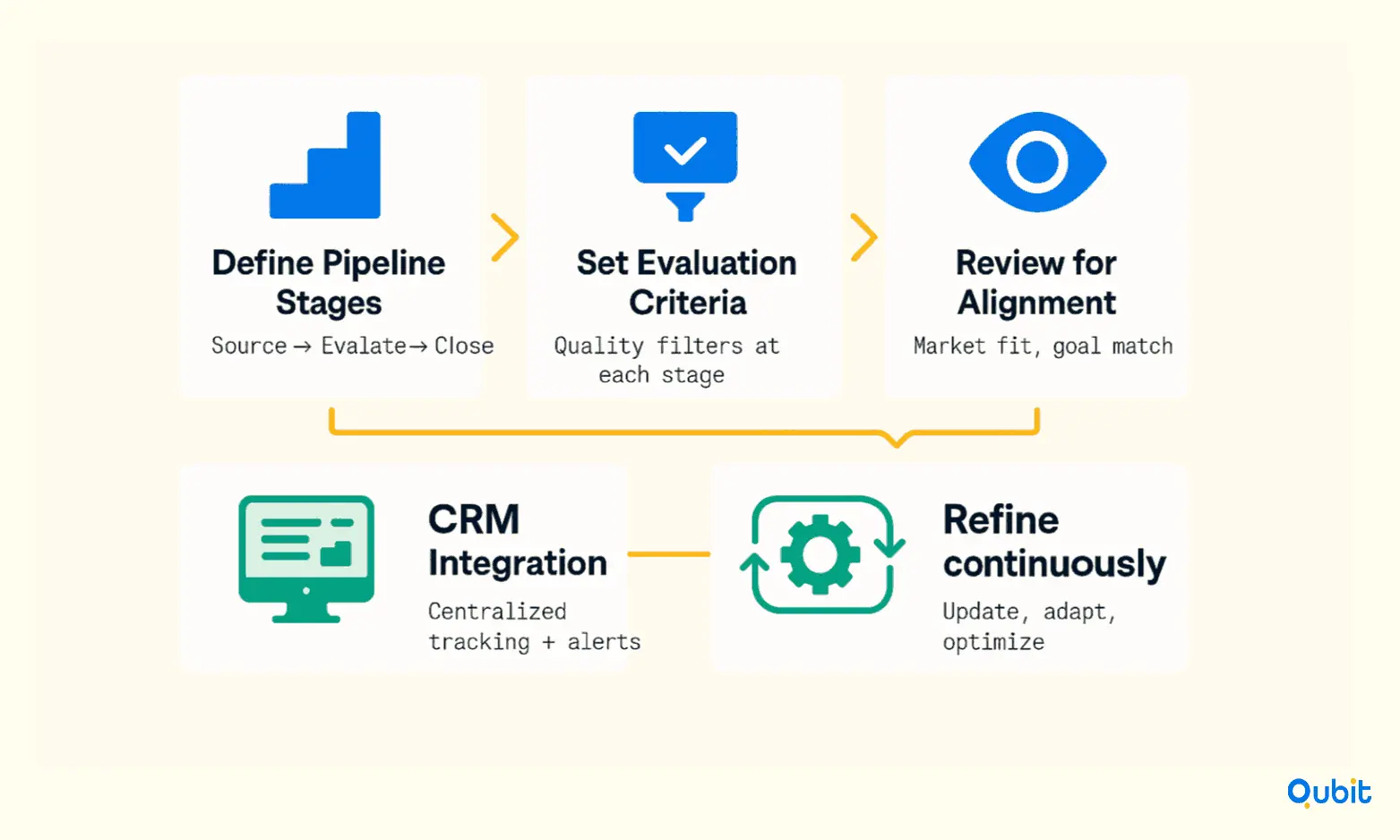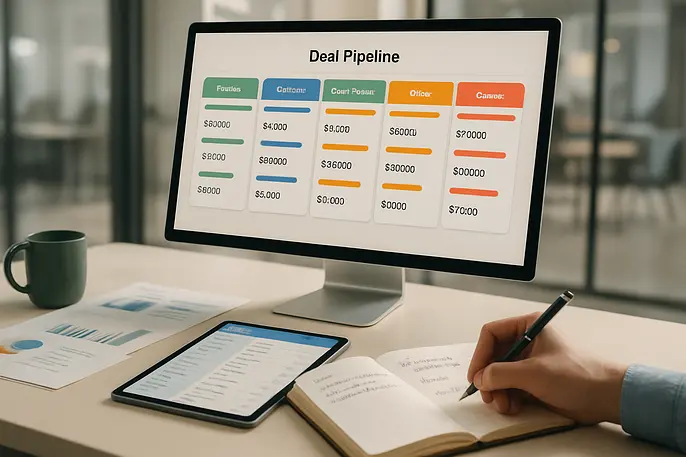Effective deal sourcing is the cornerstone of successful investment strategies. Identifying high-potential opportunities early and managing them through a structured pipeline can significantly enhance decision-making and outcomes. This article explores the essential components of deal sourcing and pipeline management, offering actionable insights for investors and venture capitalists.
From refining your investment thesis to utilizing digital platforms and alternative sourcing channels, mastering these processes is critical to building a robust investment pipeline. For a broader perspective on identifying startups at their earliest stages, explore proven startup scouting strategies.
Whether you're an experienced investor or just starting, understanding these frameworks will empower you to streamline your approach and maximize returns. Let’s dive into the strategies that drive investment success.
Understanding Deal Sourcing
Deal sourcing is the structured process of identifying and acquiring potential investment opportunities, a cornerstone activity for venture capital (VC) and private equity firms. This systematic approach not only fuels the investment pipeline but also plays a pivotal role in establishing a competitive advantage in the market.

For firms operating in the high-stakes world of venture capital, sourcing quality deals is paramount. The ability to consistently identify promising startups or businesses with high growth potential can set a firm apart from its competitors. As Chris Dixon of Andreessen Horowitz (A16Z) aptly noted, the value of deal sourcing far outweighs deal picking, with sourcing accounting for 90% of success compared to just 10% for picking. This underscores the importance of a robust sourcing strategy that prioritizes both quality and volume.
To achieve this, many firms adopt proactive measures to build a strong deal pipeline. Evaluating proactive sourcing maneuvers naturally reveals how to create a deal sourcing strategy by outlining systematic approaches for engaging with high-potential startups. These strategies often involve leveraging networks, utilizing technology, and maintaining a consistent presence in industry events to ensure a steady flow of opportunities.
Defining Your Investment Thesis
An investment thesis serves as the cornerstone of a successful investment strategy, acting as a precise filtering mechanism to identify opportunities that align with your goals. By clearly defining your thesis, you ensure that your focus remains on deals that not only match your strategy but also reflect broader market trends and technological advancements.
A well-crafted investment thesis does more than just streamline decision-making; it positions you to stay relevant in a rapidly evolving market. For instance, aligning your thesis with emerging technologies or shifting consumer behaviors ensures that your portfolio remains adaptable to future opportunities. This approach is particularly critical in competitive environments, as highlighted by Forbes, which depicts how staying attuned to market dynamics can sharpen your edge in dealmaking.
Moreover, an investment thesis provides clarity on which opportunities to pursue and which to pass on, saving valuable time and resources. This clarity becomes even more impactful when considering the dynamics of deal sourcing. A balanced perspective on managing deal pipelines is reflected in the discussion of inbound vs outbound startup deal flow, which examines how different sourcing methods interact within the broader startup ecosystem. By refining your thesis, you can better determine which channels align with your strategy and focus your efforts accordingly.
Expanding Your Network for Exclusive Deals
Building a robust professional network is a cornerstone of accessing high-quality, exclusive deals. Strong connections often lead to opportunities that remain out of reach for those relying solely on traditional methods. By prioritizing relationship-building, you can position yourself as a trusted partner in your industry, increasing the likelihood of receiving valuable deal referrals.
Trust is the foundation of any successful network. When you invest time in cultivating genuine relationships, you create a reputation that encourages others to share opportunities with you. For instance, insights from event-based networking are further detailed through startup scouting at tech conferences, offering nuanced observations on in-person engagements with startups. These gatherings provide a platform to meet like-minded professionals, exchange ideas, and uncover potential deals that may not be publicly available.
Proactive Strategies for Effective Deal Sourcing
Identifying and closing attractive deals quickly requires a proactive mindset and a structured approach. Proactive deal sourcing, when combined with data-driven strategies, can significantly enhance the efficiency and success of investment efforts. By adopting innovative outreach techniques and leveraging technology, investors can uncover opportunities that might otherwise remain hidden.
1. Prioritize Outbound Sourcing Methods
Outbound sourcing methods are a cornerstone of proactive deal sourcing. Instead of waiting for opportunities to come to you, actively reaching out to potential targets can yield a higher volume of quality leads. According to the Affinity Predictions Report, outbound sourcing trends are gaining traction as they allow investors to identify opportunities earlier in the pipeline. This approach not only expands your reach but also ensures that you’re engaging with startups and businesses before they enter competitive bidding scenarios.
2. Harness the Power of Data-Driven Insights
Data-driven deal strategies are transforming how investors identify and evaluate opportunities. By analyzing market trends, industry benchmarks, and company performance metrics, investors can make informed decisions faster. Firms like A16Z emphasize the importance of integrating data into deal sourcing processes, highlighting how predictive analytics and machine learning can uncover patterns that traditional methods might miss. These insights enable investors to focus their efforts on high-potential opportunities, reducing the time spent on less promising leads.
3. Explore Alternative Sourcing Channels
Expanding beyond traditional networks can open doors to untapped opportunities. For instance, scouting startups from accelerators and hackathons introduces investors to innovative ventures at their earliest stages. These environments often foster groundbreaking ideas and provide access to founders who are eager to collaborate. By exploring these alternative channels, investors can diversify their deal flow and gain a competitive edge in discovering emerging opportunities.
4. Build Relationships Through Targeted Outreach
Proactive deal sourcing isn’t just about identifying opportunities, it’s also about building meaningful relationships. Tailored outreach efforts that address the specific needs and goals of potential partners can establish trust and credibility. This personalized approach ensures that your firm stands out in a crowded market, increasing the likelihood of securing favorable deals.
5. Combine Technology with Human Expertise
While technology plays a critical role in streamlining deal sourcing, human expertise remains irreplaceable. Platforms that integrate CRM tools, AI-driven analytics, and automated workflows can help manage and prioritize leads efficiently. However, the ability to interpret data, assess qualitative factors, and negotiate effectively still relies on human judgment. Striking the right balance between technology and personal insight is key to maximizing success.
Proactive deal sourcing is no longer optional in today’s fast-paced investment landscape. By adopting outbound sourcing methods, leveraging data-driven insights, and exploring alternative channels, investors can stay ahead of the curve.
Challenges in Deal Sourcing and Pipeline Management
Deal sourcing and pipeline management face distinct challenges:
- Quality vs. Quantity: Balancing a large deal flow without overwhelming the evaluation capacity.
- Data Quality: Incomplete or inaccurate startup information complicates screening.
- Resource Limitations: Limited personnel or time can hinder consistent sourcing.
- Pipeline Fatigue: Prolonged evaluation stages risk losing momentum and deals.
Addressing these challenges requires clear prioritization, process discipline, and technology adoption.
Optimizing Digital Platforms for Effective Deal Flow Management
Digital deal sourcing has revolutionized how investors identify opportunities and manage their pipelines. Tools like AngelList, Crunchbase, and PitchBook provide comprehensive databases, detailed market data, and integrated workflows that significantly enhance sourcing efficiency.
Streamlining Deal Discovery
These platforms simplify the search for promising deals by offering access to rich datasets, including company profiles, funding histories, and industry trends. Crunchbase and PitchBook, for example, enable investors to uncover high-potential startups without the labor-intensive manual research traditionally required. AngelList facilitates direct connections between investors and startups, fostering collaboration and transparency.
Enhancing Pipeline Management
Effective pipeline management depends on organizing leads, tracking interactions, and monitoring progress. Many digital tools incorporate CRM functionalities that assist investors in prioritizing deals based on engagement and milestones. Maintaining an active, well-managed pipeline is crucial to avoid stagnation and preserve deal momentum. Understanding pipeline dynamics and applying best practices can keep sourcing efforts productive and targeted.
Analytics for Smarter Decisions
Analytics embedded within these platforms empower investors to measure outreach efficiency, track response rates, and detect engagement patterns. These insights help refine sourcing strategies and ensure focus remains on the most promising opportunities. Additionally, social media sourcing tools, such as Fanbridge, open unconventional channels to discover innovative startups gaining traction.
Exploring Alternative Channels for Sourcing Deals
Expanding beyond conventional networks can uncover unique opportunities for alternative deal sourcing. Channels like startup accelerators, demo days, university R&D programs, and platforms such as Product Hunt provide access to early-stage innovation and diversified deal flow. These avenues not only enhance the pipeline but also introduce fresh perspectives and untapped potential.
1. Startup Accelerators and Demo Days
Startup accelerators, such as Y Combinator or Techstars, are hubs for emerging businesses. Their demo days offer direct exposure to promising startups, allowing investors to assess ideas and teams in real-time. These events often showcase ventures with high growth potential, making them ideal for identifying early-stage opportunities.
2. University R&D Programs
Universities are breeding grounds for innovation, particularly within their research and development programs. Collaborating with institutions like Harvard Business School, which has explored geographic diversification in deal sourcing, can provide access to cutting-edge technologies and groundbreaking ideas.
3. Platforms Like Product Hunt
Digital platforms such as Product Hunt are invaluable for discovering emerging products and startups. By monitoring trends and engaging with creators, investors can identify ventures that align with their portfolio goals. These platforms often feature startups that are gaining traction, offering a glimpse into future market disruptors.
4. Industry Events and Conferences
Attending industry-specific events and conferences can also be a fruitful strategy. These gatherings bring together innovators, thought leaders, and investors, creating a dynamic environment for deal sourcing. Networking at such events often leads to connections with startups that may not yet be on the radar of traditional channels.
Building Consistent Deal Flow Systems
Creating a reliable system for consistent deal flow is essential for capturing quality investment opportunities. By implementing systematic processes and utilizing dedicated CRM tools, businesses can streamline pipeline management and ensure they remain competitive in dynamic markets.

Establishing Systematic Processes
A well-defined process is the backbone of any effective deal flow system. Start by identifying key stages in your pipeline, from sourcing opportunities to closing deals. Each stage should have clear criteria to evaluate potential investments, ensuring only high-quality opportunities progress. Regularly reviewing these criteria helps maintain alignment with evolving market trends and business goals.
CRM Integration for Streamlined Management
Dedicated CRM tools are indispensable for managing deal flow effectively. These systems centralize data, track interactions, and automate follow-ups, reducing manual effort and improving accuracy.
Continuous Refinement
Markets are constantly shifting, and deal flow systems must adapt accordingly. Regularly analyze sourcing strategies to identify areas for improvement. This could involve expanding your network, refining outreach methods, or adopting new tools to enhance efficiency. By staying proactive, businesses can ensure their pipeline remains robust and responsive to emerging opportunities.
Investing in systematic processes and CRM integration not only simplifies pipeline management but also positions businesses for sustained growth.
Legal and Compliance Considerations in Deal Sourcing
In the fast-paced world of deal sourcing, early legal and compliance screening is crucial to mitigate risks and ensure a smooth investment process. Addressing legal issues upfront saves time, protects reputation, and prevents costly deal failures.
Initial Background Checks and Confidentiality Agreements
Before diving deep into negotiations, investors should conduct thorough background checks on potential targets and their key stakeholders. This includes verifying ownership structures, any pending litigation, intellectual property status, and financial integrity. Equally important is establishing strong confidentiality agreements (NDAs) early to protect sensitive information shared by startups during discussions.
Regulatory Compliance
Investors must ensure that both the deal and the target company comply with applicable laws and regulations. This ranges from securities laws governing the sale and transfer of equity to data privacy laws (e.g., GDPR, CCPA) affecting how startups collect and manage customer information. Non-compliance can result in deal delays, penalties, or even deal nullification.
Engaging Legal Counsel Early
Bringing legal experts into the deal process at an early stage provides critical guidance on structuring transactions, conducting due diligence, and identifying any regulatory hurdles. Experienced counsel can flag potential deal breakers, help navigate complex cross-border legal environments, and advise on drafting contracts that protect investor interests.
Ongoing Compliance and Governance
Legal diligence doesn’t end at deal closure. Investors should establish mechanisms to monitor the target’s ongoing compliance with contractual obligations, financial reporting standards, and corporate governance practices. This helps prevent surprises post-investment and facilitates smoother integration or exit strategies.
Integrating Deal Sourcing & Pipeline Management
Effective deal sourcing and pipeline management are two interconnected pillars of successful investment workflows. When aligned, they create a seamless process that drives efficiency and maximizes opportunities.
The Role of Integration
A well-integrated approach ensures that deal sourcing feeds directly into pipeline management, eliminating bottlenecks and enhancing decision-making. By streamlining communication between these functions, teams can prioritize high-value opportunities while maintaining a clear view of the investment pipeline. This alignment reduces redundancies and ensures that every deal progresses smoothly through the pipeline stages.
Actionable Insights for Optimization
Centralize Data: Consolidating deal sourcing and pipeline data into a single platform allows teams to access real-time insights and track progress efficiently. This minimizes the risk of missed opportunities and ensures transparency across the workflow.
Automate Processes: Implementing automation tools can simplify repetitive tasks, such as initial deal screening and pipeline updates. Automation frees up time for strategic analysis and ensures consistency in data handling.
Regular Reviews: Conducting periodic reviews of the pipeline helps identify gaps and refine sourcing strategies. These reviews ensure alignment with broader investment goals and provide actionable feedback for improvement.
Benefits of Alignment
Integrating deal sourcing with pipeline management not only improves workflow optimization but also enhances collaboration across teams. It fosters a proactive approach to identifying and managing opportunities, ultimately leading to better investment outcomes.
Conclusion
Effective deal sourcing requires a blend of traditional networking and modern digital tools. Throughout this blog, we’ve explored strategies to optimize your approach, including the importance of pipeline management and leveraging investment insights to identify high-value opportunities. Combining these methods ensures a streamlined process that aligns with your investment goals.
At Qubit Capital, we specialize in connecting investors with exceptional opportunities through our tailored services. If you’re ready to elevate your deal sourcing, contact us today. Our Startup Scouting service is designed to help you discover top-tier investment prospects and build a robust pipeline. Let us help you take the next step toward achieving your investment objectives.
Key Takeaways
- Clear definitions and systematic approaches are crucial for effective deal sourcing.
- A well-aligned investment thesis filters deals and enhances strategic focus.
- Networking and relationship-building remain essential alongside digital tools.
- Proactive outreach and diversified channels accelerate deal pipeline development.
- Effective pipeline systems and analytics tools ensure consistent deal flow.
Frequently asked Questions
What is deal sourcing?
Deal sourcing refers to the process of identifying, evaluating, and acquiring investment opportunities. Investors, venture capitalists, and private equity firms use this method to discover potential deals that align with their financial goals and strategies.


 Back
Back



